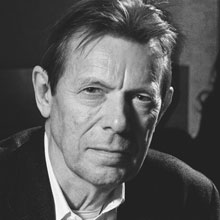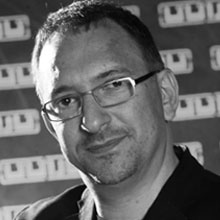SIB BOARD OF GOVERNORS

President / Executive Director, European Think Tank on Film & Film Policy Since the late 90s he is Chair of Cultural Affairs at the Danish National UNESCO Commission. Adjunct Professor, CBS, Copenhagen Business School, Department of Organisation and Industrial Sociology. Director, Danish National Film School; CEO & Principal, National Film & Television School, U.K and Founder of CREATEC (National Creative Arts and Technologies Centre) under the NFTS, UK CEO, Danish Film Institute 1998-2007 and Board member, Norwegian Film Institute. National distinctions: ‘Knight of the Dannebrog’ (2005) Foreign distinctions: Awarded ‘Chevalier de l´Ordre des Arts et des Lettres’, by the French Minister for Culture, Jack Lang (1990) for services towards film culture worldwide. Awarded ‘Ars Gloria’ Silver Medal from Polish Minister for Culture WaldemarDabrowski (2005)

Film Director / Writer Born and raised in Beirut, has made more than 40 films throughout his career, ranging from reports and documentaries to more personal and fictional films, all- taking place in various countries around the world. All of these films have been featured at a number of Arabic and international TV channels. His first feature film “Bosta” the first post-war musical since the return of peace in Lebanon. Won six different international awards among which best script in Carthage film festival, Golden Murex in Lebanon and best first film at the Biennale of the Institut du Monde Arabe in Paris. In July 2006, as war once again ravaged his country, Aractingi reacted, in the heat of the moment, by shooting his second feature film: “Under the Bombs.” Selected to participate at the 64th Venice Film Festival, Sundance and Dubai Film Festivals, the film has won more then 22 prizes so far, including the Human Rights Film Award in Venice, and the Golden Muhr for Best Film and Best actress in the Dubai Film Festival.

Director / Producer, Owner of Periba Productions He started his career in the early 90’s, have directed more than 40 TV shows. Has worked in most of the startling Arab cities and Europe. Awards:
– Best Director (Music Clip) – Beirut Film Festival 1997
– Best Video Clip for a new artist – Oscar el Video Clip 2004
– Best TV Director 2007 (Private Magazine)

Director / Actress She holds a BA Communication Art (Radio TV and Films) from Notre Dame University Lebanon. Co-owner of Clap Productions Lebanon. Director for more than 160 Musical Videos for Arab Artists, which has been shot in Lebanon and more than 15 Arabic, European and Asian Countries. Director for more than 50 Concerts & Festivals for most famous Arab Artists in Beirut, Cannes, Paris, Charm El Sheikh, Carthage and Washington. Acting career: Mirna played the main role Actress in the feature film ” THE DAWN ” directed by Tony Abou Elias and a film about NizarKabbani’s biography directed by CharbelKamel.

is the founder and project manager of Bright I, a consulting and production/distribution company that provides advisory services to regional broadcasters, coaching TV Presenters as well as creating and developing mobile apps for multiple platforms. With a career of over 24 years in broadcast television, he has worked across the entire spectrum of pay and free TV platforms, from the Middle East, North Africa, and across the world. During this career he was the head of acquisition and sales for all 6 stations within the Lebanese Broadcasting Corporation (LBC): the number 1 television station in Lebanon and one of the leading satellite stations in the Middle East, a music channel, and 3 subscription channels.
DONORS &
SPONSORS

International Media Support (IMS)is a non-profit organisation working with media in countries affected by armed conflict, human insecurity and political transition. In more than 30 countries worldwide, IMS helps to strengthen professional practices and ensure that media and media workers can operate under challenging circumstances.
IMS supports local media in countries affected by armed conflict, human insecurity and political transition. IMS was established in 2001 in the wake of the tragic events in Rwanda and the former Yugoslavia. In the 1990s, these and other conflicts saw media being manipulated and used as a tool to fuel violent conflict. IMS was set up in response to this trend with aim to helping local media working in conflict-affected areas to remain operative and professional. Today, IMS activities cover three thematic areas of engagement. In addition to media and conflict, IMS is engaged in media and democracy activities in countries in transition in Eastern Europe and Central Asia, and in media and dialogue activities mainly covering the Arab world and Iran.
IMS is committed to freedom of expression, and the work of IMS adheres to recognized international human rights and freedom of expression standards endorsed by the international community including the Universal Declaration of Human Rights, various UN Security Council Resolutions as well as the UNESCO Windhoek Declaration which defines the international principles for independent and pluralistic media.
IMS firmly believes that it must undertake its work in a cooperative and collaborative manner. On this there can be no compromise. Coordination with existing local and international initiatives is key. So is the collaboration with specialized international, regional and local media organizations and institutions as a necessary means to achieve impact. In certain situations, IMS provides a function as gap-filler, addressing needs that are not being met by anyone else. We seek to act flexibly and rapidly to be able to offer assistance when and where help is most needed.
International Media Support (IMS): www.mediasupport.org





